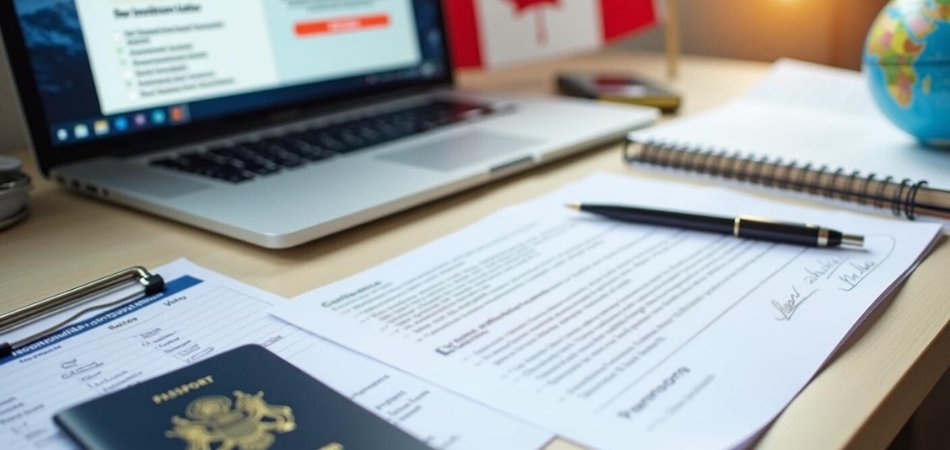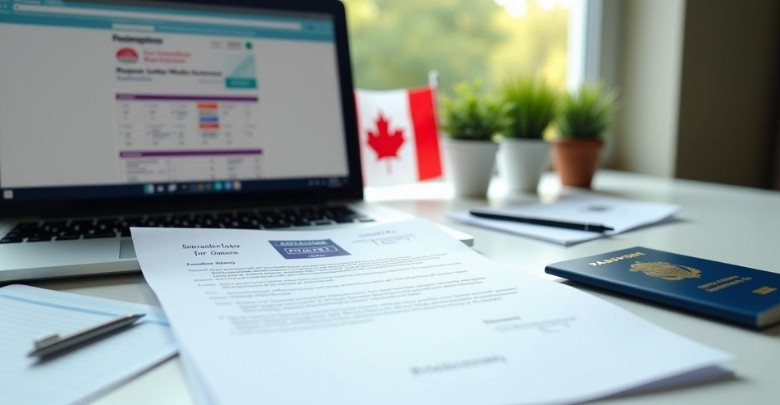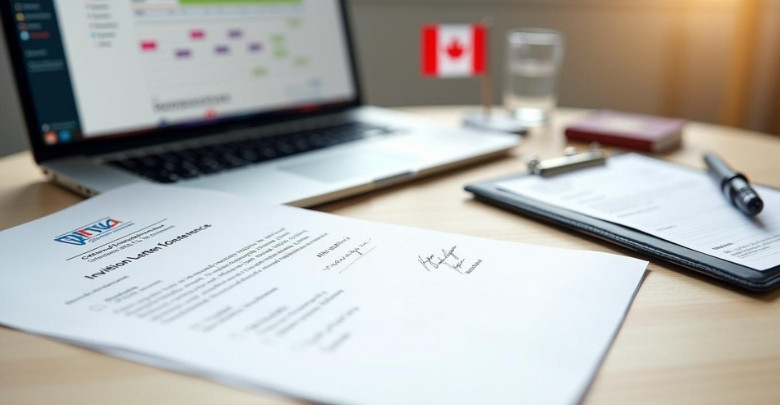Conferences in Canada are growing today, with professionals and enthusiasts discussing innovation and collaboration. If you’re curious about attending these events, a common question you may have is how to get conferences in Canada in 2025 with a free invitation letter.
To get a free invitation letter for Canadian conferences in 2025, research events relevant to your field, visit their official websites, and look for “registration” or “invitation letter” sections. Most conferences provide these letters after you register or submit an application. Ensure to meet eligibility criteria, like presenting a paper or attending as a delegate.
Are you curious about learning more? You can find all the details and insights you need to secure conference invitations in Canada, including essential tips and steps to make the process simple and successful. Stay tuned!
How to Get Conferences in Canada in 2025 With a Free Invitation Letter? A Step-by-Step Guide
Securing a free invitation letter for conferences in Canada requires strategic research, direct communication with event organizers, and potential contributions like presenting research. This process can also be made easier by being aware of sponsorship, grant, and waiver opportunities.

1. Research Conferences in Canada
- Search for Conferences: Use platforms like Global Conference Alliance to find relevant conferences in Canada. Filter them by your field of interest.
- Check University Websites: Many universities and research institutions in Canada organize conferences. Look at the conferences or events pages of institutions like the University of Toronto, University of British Columbia, McGill University, or other academic and professional institutions in Canada.
2. Look for Free Invitation Letters
- Inquire Directly With Organizers: Contact the conference organizers directly. Some conferences may provide an invitation letter for participants, particularly if they are presenting papers, workshops, or research. It’s important to explain why you’re interested in attending and why you need an invitation letter for visa purposes.
- Offer a Presentation or Contribution: Many conferences offer free invitations or waivers to those who are willing to present a paper or offer a workshop. Submitting an abstract or proposal for a presentation is one of the best ways to secure a free invitation letter.
- Check for Student or Early Career Researcher Opportunities: Some conferences offer fee waivers or free invitations for students or early-career professionals. These opportunities are often announced on the conference website or via email, so make sure you’re on the mailing list.
- Ask for Sponsorship: Some conferences provide sponsorships or waivers for people from developing countries or underrepresented regions. Check if there are any such initiatives for the conference you are interested in.
3. Prepare Your Request
- Write a Professional Email: When requesting a free invitation letter, ensure your email is formal and clear. Introduce yourself, explain why you are interested in the conference, and kindly request a free invitation letter for visa purposes. Emphasize any contributions you may have to the event (e.g., presenting a paper, chairing a session, etc.).
- Offer Your Contribution: Highlight your skills and any possible contribution to the conference. This could increase your chances of getting a free invitation letter.
4. Keep an Eye on Visa Waivers
- Research Visa Waivers: In some cases, depending on the type of conference and your country of origin, Canada may offer visa waivers or simplified procedures for attendees from certain countries. Check if the conference you’re attending is included in such programs.
5. Look for Conferences Offering Grants
- Grants for Conference Participation: Some conferences, especially academic ones, provide grants to cover registration fees and sometimes even travel expenses. Apply for these grants and ask if an invitation letter is included in the grant process.
- Professional Associations: Many academic and professional associations have grants, travel awards, or scholarships for members to attend conferences. Check whether you qualify for any of these opportunities.
6. Use Social Media and Networks
- Network: Sometimes, networking can lead to an invitation letter. Join professional networks (such as LinkedIn, ResearchGate, or academic mailing lists) to connect with people who might invite you to a conference in Canada or provide recommendations.
7. Follow Up
- Send a Reminder: If you have not received a response to your request after a couple of weeks, follow up with a polite reminder.
Securing a free invitation letter for a conference requires careful planning. So, when planning for international conferences in Canada, be proactive in communication, explore grants, and offer contributions to increase your chances of receiving an invitation letter for 2025 events.
Who Can Get a Free Invitation Letter for Conferences in Canada?
In Canada, attending conferences can be a great way for people to meet new people, gain knowledge, and develop. However, obtaining a free invitation letter depends on specific eligibility and criteria determined by organizers.
- Invited Speakers: Individuals selected to present their work or give lectures often receive free invitation letters as part of their participation package.
- Scholarship Recipients: Participants awarded conference scholarships usually qualify for free invitation letters to facilitate their attendance without additional cost.
- Student Representatives: Many conferences provide invitation letters to students representing institutions or projects upon verifying their involvement in relevant fields.
- Panel Members: Participants who are part of discussion panels or working committees at the event may be eligible for free invitation letters.
- Paper Contributors: Authors whose research papers or projects are accepted for presentation might qualify for free invitation letters from organizers.
- Partner Organization Members: Employees or members of organizations partnering with the conference are often issued free invitation letters as part of the collaboration.
Knowing the eligibility for free invitation letters can save time and effort. Always verify the specific requirements and processes outlined by the conference organizers for accurate guidance.
Why Do You Need a Free Invitation Letter for Canadian Conferences?
Participating in Canadian conferences can open doors to incredible opportunities. However, for many attendees, getting an invitation letter is an essential step to ensure smooth travel and participation in the event.

Visa Application Requirements
Many international attendees require a Canadian visa to attend conferences. Immigration authorities often need proof of your visit’s purpose, and an invitation letter serves this need. It establishes your connection with the conference, indicating your intent to attend and return after the event, improving your visa approval chances.
Proof of Event Participation
An invitation letter is an official acknowledgment of your participation in the conference. It confirms your registration and role in the event. Whether attending as a speaker, presenter, or participant, this document ensures that event organizers recognize your involvement and help you validate your attendance when required.
Travel Grant or Sponsorship Proof
When applying for travel grants or sponsorships, an invitation letter is often necessary. It demonstrates to funding organizations or institutions that your attendance is official. This assurance strengthens your request for financial support by proving the legitimacy of the event and your importance as an attendee.
Clarification of Purpose to Authorities
Immigration or airport officials may inquire about the reason for your visit to Canada. Having an official invitation letter can streamline this process. It provides clear evidence of your intent to attend the specific event, reducing complications or delays during travel or entry procedures.
Assistance With Travel Planning
Conference organizers may use invitation letters to include additional details like schedules or accommodation arrangements. These details help you manage your travel plans more efficiently, ensuring you arrive on time and have the necessary information to participate in the event smoothly.
A free invitation letter simplifies many aspects of attending a Canadian conference. It’s an essential document for travel, official processes, and logistical support. Contact organizers early to ensure you meet their requirements.
How to Find Conferences in Canada Offering Grants and Invitation Letters for Participation?
Finding conferences in Canada that offer grants and invitation letters can be both exciting and challenging. Many opportunities exist, but knowing where to look and how to apply effectively can save you time and effort. Below, you’ll find essential tips to find these conferences.
Check University and Academic Websites
Most universities in Canada regularly host conferences and often share details on their official websites. These events frequently offer grants or funding for participants, especially for students and early-career researchers. Make a habit of exploring academic calendars, as they sometimes include information on securing an invitation letter for visa purposes.
Explore Professional Association Portals
Professional organizations often list upcoming conferences on their websites. For instance, engineering societies or medical associations in Canada may announce conferences that include grant opportunities. Additionally, these organizations frequently provide detailed instructions for attendees on obtaining invitation letters for visa applications.
Use Online Platforms for Conference Listings
Websites dedicated to event listings, like Global Conference Alliance, are great for finding top conferences in Canada. These platforms often filter events by location, field, or funding availability. Look for details about application deadlines, grant eligibility, and instructions for requesting an official invitation letter.
Review Government and NGO Opportunities
Canadian government departments and international NGOs sometimes sponsor conferences. They also provide grants for selected participants to support their travel and stay. Visit official government pages or the websites of well-known NGOs to identify conferences relevant to your field and learn how to apply for financial support.
Network Through Social Media and Forums
Social media groups and forums related to your profession or academic interest can be goldmines for conference announcements. Professionals often share information about grants and the process for securing invitation letters. Following Canadian institutions and conference organizers on platforms like LinkedIn and Twitter can also keep you updated.
Securing grants and invitation letters for Canadian conferences requires consistent effort and smart research. By using the resources and tips mentioned, you can simplify your process and focus on attending enriching events in your field.
Tips to Ensure Your Invitation Letter Request is Approved For Conferences in Canada
Getting your invitation letter request approved for conferences in Canada requires precision and professionalism. It’s important to follow specific steps to increase your chances and ensure you meet all the requirements for success.
- Be Clear and Professional in Your Email: Make sure your email is polite, well-structured, and professional. Explain why you want to attend and how the conference aligns with your goals or expertise.
- Highlight Your Contribution to the Event: Mention if you plan to present a paper, host a workshop, or participate in discussions. Offering to contribute increases your chances of receiving an invitation letter.
- Provide Relevant Documentation: Attach all requested documents, such as your ID, proof of affiliation, or details of your research or work. Ensure everything is complete and up-to-date.
- Explain the Need for a Visa: Be clear about why you need an invitation letter for visa purposes. Provide brief details about your travel plans to make your request more understandable.
- Submit Your Request Early: Don’t wait until the last minute to request your invitation letter. Submitting your request well in advance shows seriousness and allows time for any necessary follow-ups.
- Follow the Conference Guidelines: Make sure to read the conference website and application instructions carefully. Ensure you meet all requirements before sending your request to avoid unnecessary delays.
- Send a Follow-Up Email: If you haven’t received a response within a week or two, send a polite follow-up email. It shows your continued interest and helps keep your request on the organizer’s radar.
Securing an invitation letter for Canadian conferences requires clear communication, timely action, and providing necessary documents. By following these tips, your chances of receiving approval for the letter will significantly improve, ensuring a smooth process.
What to Include in Your Invitation Letter Request for Canadian Conferences?
When requesting an invitation letter for a Canadian conference, it’s essential to provide accurate details. A well-structured request helps conference organizers understand your purpose and ensures your application is considered. Here’s what to include to make your request more effective.

Introduce Yourself Clearly
Begin your request by introducing yourself in a clear and concise manner. Include your full name, job title or academic role, and the organization or institution you’re affiliated with. Make sure to explain your professional background briefly so the organizers understand your qualifications and interest in the conference.
State the Purpose of Your Request
Clearly state the reason for your invitation letter request. Indicate whether you require it for visa purposes or if you’re planning to attend as a participant. Include the conference’s name, date, and location to help the organizers understand the context and urgency of your request, especially if visa arrangements are involved.
Explain Why You Want to Attend
Share why attending the conference is important for you. Specify what sessions or topics interest you the most and how they relate to your current academic or professional goals. Mention any speakers, workshops, or discussions you are eager to engage in, as this demonstrates your genuine interest in the event.
Mention Any Contribution You Plan to Make
If you’re offering a presentation, workshop, or paper, make sure to mention it. Organizers are more likely to provide an invitation letter to active participants. Clearly outline your contribution, such as presenting research or facilitating a session, and how your involvement will add value to the conference program.
Provide Necessary Documents
Attach the necessary documents to support your request, such as a copy of your resume, a valid passport, or proof of your academic or professional affiliation. Double-check the conference’s website to see if they have specific requirements. Submitting all requested documents ensures your request is complete and reduces delays.
A professional invitation letter request should include all the necessary details, such as your personal introduction, purpose for attending, and relevant documents. Following these steps will increase your chances of receiving approval and ensure smooth planning for attending Canadian conferences.
Common Mistakes to Avoid When Applying for Free Invitation Letters to Canadian Conferences
Applying for a free invitation letter to Canadian conferences can be a rewarding opportunity, but there are common pitfalls to avoid. Ensuring your request is well-prepared and complete will help improve your chances of getting a favorable response. Here are some mistakes to steer clear of.
Submitting an Unclear or Incomplete Request
An incomplete request can confuse conference organizers and result in delays. Be sure to clearly state your intent, including your name, affiliation, purpose for attending, and any specific information about your participation. An incomplete email may be overlooked, so ensure all details are included in your initial request.
Failing to Follow Instructions
Many conferences outline specific instructions for requesting invitation letters. Ignoring these guidelines or not adhering to the process can result in your request being disregarded. Carefully read all conference instructions and follow them exactly to avoid your request being dismissed due to missing or incorrect information.
Requesting at the Last Minute
Procrastinating until the last moment can hinder your chances of receiving a timely invitation letter. Conference organizers require time to process requests, and submitting your application too late can result in delays. Aim to request the letter well in advance to allow for necessary processing time and any possible follow-up.
Not Clearly Stating the Need for a Visa
If your invitation letter is required for visa purposes, make sure to mention this clearly in your email. Failing to specify this need may cause confusion and result in a delayed or rejected request. Clearly explain why the invitation letter is essential for your visa application to avoid misunderstandings.
Being Too Informal or Impolite
A professional and polite tone is crucial when communicating with conference organizers. Avoid casual language, slang, or demanding requests. A respectful and formal approach will show organizers that you take the invitation request seriously, improving the likelihood of a positive response and increasing your chances of approval.
Ignoring Document Requirements
Each conference may have specific documentation requirements for invitation letter requests. Make sure to review the conference’s guidelines carefully to avoid overlooking essential documents like your resume, passport copy, or any supporting documents. Submitting all required documents will ensure your request is processed smoothly and without delays.
By avoiding these common mistakes, you can significantly improve the likelihood of your invitation letter request being approved. Stay organized, follow instructions carefully, and ensure your communication is professional, giving you a better chance to attend Canadian conferences without issues.
Key Factors to Consider When Applying for a Free Invitation Letter for Canadian Conference
When applying for a free invitation letter to attend a Canadian conference, it’s important to approach the process carefully. Paying attention to key factors can increase your chances of approval and help you prepare for attending the event. Below are some essential points to consider.
Conference Relevance to Your Goals
Ensure the conference aligns with your academic or professional objectives. Organizers are more likely to approve invitation letters for individuals whose work or studies are related to the event topics. Highlight how attending the conference will benefit your work or interests, showing the value you’ll gain by participating in the event.
Eligibility for Invitation Letters
Not all attendees qualify for free invitation letters. Review the conference website or contact the organizers to understand eligibility requirements. Some events prioritize presenters, panelists, or attendees from specific regions. Confirm that you meet these requirements before submitting your application to avoid unnecessary delays or rejection.
Submitting Your Request on Time
Late submissions can result in denied or delayed invitation letters. Organizers need time to process requests, especially for visa-related purposes. Submit your application as early as possible to give yourself sufficient time to make travel arrangements and avoid last-minute complications that could jeopardize your attendance.
Considering the Costs of Attendance
Even if you secure a free invitation letter, there may still be associated costs for attending. It’s important to consider the average budget for attending a conference, which may include travel, accommodation, and registration fees. Preparing for these costs will help you avoid unexpected financial burdens.
Providing Accurate Documentation
Incomplete or inaccurate documentation can lead to rejected requests. Include all necessary documents, such as your CV, passport, and proof of your affiliation. Double-check all details to ensure accuracy and compliance with the conference’s requirements, making your request more likely to be approved without delays.
Careful planning and attention to detail are essential when applying for a free invitation letter. By addressing these factors, you can improve your chances of approval and ensure a smoother process for attending Canadian conferences.
Tips for Effectively Following Up on Your Free Invitation Letter Request for Canadian Conferences
Following up on your invitation letter request for a Canadian conference is an important step to ensure your application is processed. Being polite and timely in your follow-up shows professionalism and can help you get a response faster.

- Wait a Reasonable Amount of Time: After submitting your request, wait for at least one to two weeks before following up. This gives organizers time to review your application and respond.
- Be Polite and Respectful in Your Tone: Keep your follow-up email polite and professional. A respectful tone will increase the likelihood of a positive response and ensure your request is taken seriously.
- State Your Original Request Clearly: In your follow-up, reference your initial request and provide any necessary details like your full name and the conference name. This helps the organizer locate your request quickly.
- Express Continued Interest in the Conference: Express your interest in attending the event and explain why you would appreciate receiving the invitation letter. Highlight your eagerness to participate and engage in conference activities.
- Ask for an Update on the Status: Politely inquire about the status of your request. Avoid sounding demanding or impatient, and express your understanding that the organizers are busy with many requests.
- Offer Additional Information if Needed: Be ready to supply additional information or documentation as soon as the organizer requests it. Make the process as easy as possible for the organizers to process your request.
- Send a Final Reminder Before Taking Other Steps: If you haven’t received a response after your follow-up, send a final reminder a week or so later. Keep it professional and express your willingness to assist with any additional steps.
Following up on your invitation letter request with professionalism and patience can greatly improve your chances of receiving a response. A timely, polite, and clear follow-up ensures your request is processed smoothly for attending Canadian conferences.
Frequently Asked Questions
Knowing the process of attending conferences in Canada with a free invitation letter can raise many questions. Here are some frequently asked questions to clarify details and provide useful insights to ensure a smooth and successful experience.
How Can Networking Help Secure a Free Invitation Letter?
Networking is a powerful tool. Engage with professionals and organizers through platforms like LinkedIn or ResearchGate. Building genuine connections with researchers, speakers, or conference teams can lead to personal invitations. Participation in relevant online discussions may also highlight your expertise, increasing your chances of being invited.
Are Virtual Attendance Options Available for Canadian Conferences?
Yes, many Canadian conferences offer virtual attendance options. While virtual attendees may not always need an invitation letter, some organizers still provide them upon request. This can support professional documentation or academic requirements, even if you participate remotely.
How Do Canadian Visa Regulations Impact Conference Attendance?
Canadian visa regulations often require proof of conference attendance. Early application for the visa, along with a valid invitation letter, ensures smooth processing. Verify your country’s specific visa requirements to avoid last-minute issues. Staying informed on Canada’s immigration policies helps streamline the process.
Can Social Media Be Used to Identify Conferences Offering Invitations?
Social media platforms like Twitter and Facebook are excellent resources for identifying upcoming conferences. Follow official conference accounts, academic groups, and hashtags like #CanadaConference2025. Many organizers post updates about sponsorships, grants, and invitation opportunities on these channels.
What Are the Best Platforms for Finding Niche Conferences in Canada?
Specialized platforms like the Global Conference Alliance and academic portals help locate niche conferences in Canada. Filtering by categories such as healthcare, technology, or humanities narrows down relevant options. Subscribing to alerts ensures you stay updated on events that match your interests.
Are There Any Language Requirements for Conferences in Canada?
Most Canadian conferences are conducted in English or French. Ensure you meet language proficiency requirements, especially if you’re presenting. For non-native speakers, having your presentation materials reviewed beforehand can boost confidence and improve the chances of acceptance for contributions.
End Note
Attending conferences in Canada can open doors to learning, collaboration, and global opportunities. By planning strategically, exploring sponsorships, and reaching out to organizers, you can make the most of these events and advance your professional or academic career effectively.
So, how to get conferences in Canada in 2025 with a free invitation letter? The process involves thorough research, contacting organizers, and offering contributions like presenting a paper or workshop. Exploring sponsorships or student opportunities also increases your chances of receiving a free invitation letter.
Stay organized, start early, and maintain professional communication with conference organizers. Keep exploring opportunities, follow the guidelines carefully, and best wishes as you prepare to attend inspiring conferences in Canada!





